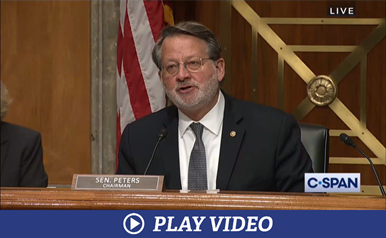VIDEO: Peters Convenes Hearing with Secretary Mayorkas to Examine Resources Needed by DHS to Address Threats and Challenges Facing Americans
WASHINGTON, D.C. – U.S. Senator Gary Peters (D-MI), Chairman of the Homeland Security and Governmental Affairs Committee, convened a hearing with Department of Homeland Security (DHS) Secretary Alejandro N. Mayorkas to examine what resources and authorities DHS needs to fulfill its mission of protecting American communities and address significant challenges facing the nation. During the hearing, Peters raised the need for the Department to have the necessary resources and tools to enhance our nation’s cybersecurity, combat the threat of domestic terrorism, support secure and efficient travel and trade at our nation’s borders, and mitigate the effects of worsening natural disasters.
“Today’s hearing is an important opportunity for this Committee to discuss the Administration’s 2023 budget request, and hear directly from the Secretary of Homeland Security on how the Department plans to use these resources to address the serious threats facing our nation,” said Peters during his opening statement. “As lawmakers, we must carefully examine these proposals, and how they will impact the Department’s critical missions to ensure the safety and security of every American.”
To watch video of Senator Peters’ opening remarks, click here. For text of Peters’ opening remarks, as prepared, click here.
To watch video of Senator Peters’ question, click here.
During the hearing, Peters urged DHS to ensure secure and efficient travel and trade across our nation’s Northern and Southern borders. While the Administration’s budget proposal includes $18 million for inspection equipment for the Gordie Howe Bridge, Peters urged the Administration to include appropriate resources for the Blue Water Bridge and other customs plazas at the Northern Border to ensure Michigan can continue to serve as an international hub of commerce. Peters and Mayorkas also discussed efforts to secure the Southern Border and manage expected changes to migration following the proposed termination of Title 42. The committee also heard how the Administration is working to detect illegal drugs like fentanyl before they reach communities in Michigan and across the country.
Peters and Mayorkas also discussed ongoing cybersecurity threats to the nation, and how the Administration will prioritize its resources to ensure that the Cybersecurity and Infrastructure Security Agency (CISA) is able to conduct its mission and implement significant cybersecurity legislation Congress has passed – including Peters’ landmark law to ensure critical infrastructure companies are reporting cyber-attacks and ransomware payments.
Peters highlighted the need for additional federal resources to support disaster mitigation efforts around the nation. As a part of the bipartisan infrastructure law, Peters secured $500 million to fund a loan program he created to help communities invest in projects that will protect against coastal erosion, flooding and rising water levels. During the hearing, Peters asked Mayorkas how DHS and the Federal Emergency Management Administration will work to implement this program as soon as possible and ensure it has the necessary resources to mitigate the risks of natural hazards – and improve our nation’s resilience.
Finally, Peters questioned Mayorkas about concerns related to Transportation Security Administration (TSA) and U.S. Customs and Border Protection (CBP) travel screening processes and the Administration’s review of the terrorist watch list and the No Fly List. In March, Peters convened meeting between Mayorkas and leaders of Michigan’s Arab and Muslim American communities in metro-Detroit to discuss concerns about experiences with the travel screening process. Following the meeting, CBP announced it will establish a new position to serve as a community relations liaison between the agency and Michigan’s Arab and Muslim American communities.
###
